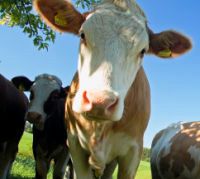

A research study recently undertaken by the Universities of Cambridge and Aberdeen have found that if our consumption of meat continues to rise at the current rate, global targets on limiting emissions could be missed. The issue is that greenhouse gases are emitted from food production, so if our meat consumption rises, so too will greenhouse gas emissions.
As it stands, the world's population is consuming more meat and dairy products than before, and if this continues more and more forest land will be cut down so the land can be used to rear livestock instead. In turn, deforestation will mean increased carbon emissions and more livestock will inevitably lead to increased amounts of methane in the atmosphere. In addition, the study suggests that fertiliser use could increase by 45% over 2009 levels.
However, the study suggested that the situation could be improved if we limit the amount of red meat we consume to two portions a week and if farmers in developing countries are helped to achieve the best possible yields from their land.
Bojana Bajzelj, the lead researcher from the University of Cambridge, said, "The average efficiency of livestock converting plant feed to meat is less than 3%, and as we eat more meat, more arable cultivation is turned over to producing feedstock for animals that provide meat for humans. The losses at each stage are large, and as humans globally eat more and more meat, conversion from plants to food becomes less and less efficient, driving agricultural expansion and releasing more greenhouse gases. Agricultural practices are not necessarily at fault here - but our choice of food is."
A stark warning was also given by co-author Professor Pete Smith of the University of Aberdeen: "Unless we make some serious changes in food consumption trends, we would have to completely de-carbonise the energy and industry sectors to stay within emissions budgets that avoid dangerous climate change. That is practically impossible - so, as well as encouraging sustainable agriculture, we need to re-think what we eat."